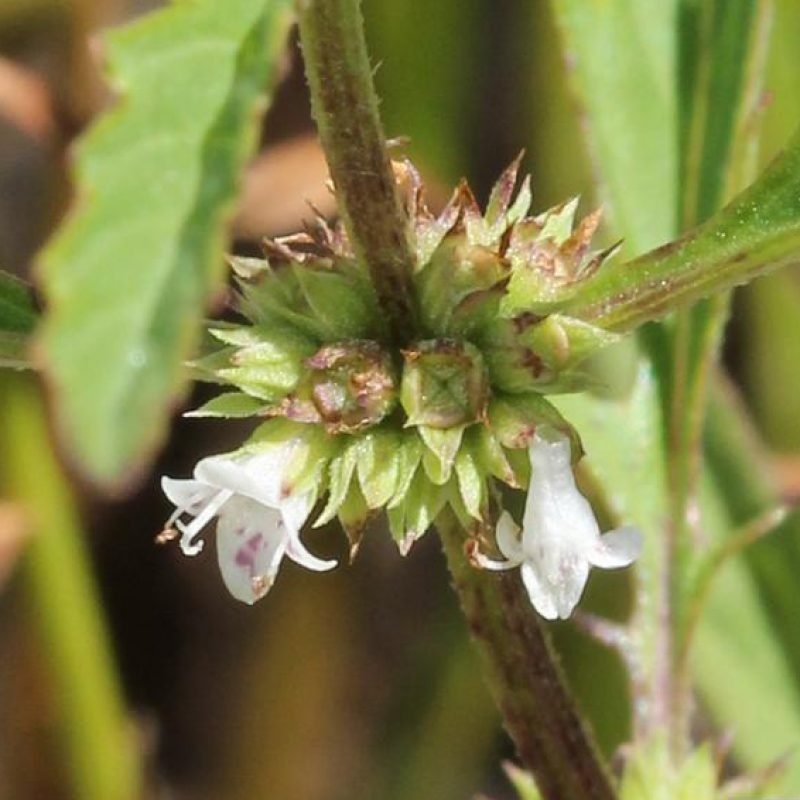Bugleweed Improves Hyperthyroid Symptoms

‘Bugleweed’ is a name used confusingly in North America to refer to the Lycopus species (L. americanus, L. europaeus, etc.) and also to Ajuga reptans. This article is concerned with the Lycopus Bugleweed. Leaves and flowers of Bugleweed make a soothing, digestive tea that alleviates symptoms of hyperthyroidism (overactive thyroid), such as diarrhea, high body temperature, anxiety, and insomnia. It also kills harmful bacteria in the gut and reduces inflammatory pain. NutraTea herbalists blended Bugleweed and other thyroid-healing herbs to create the NutraThyroid tea blend. NutraThyroid tea helps regulate thyroid activity, promotes optimal gland function and hormone regulation, and eases uncomfortable symptoms of thyroid dysfunction. NutraThyroid is a balanced, tactful blend that combines digestive Bugleweed, kelp, and licorice, with vitality-boosting nettle, ashwagandha, and ginseng, and hormone-regulating bladderwrack and lemon balm.
Bugleweed contains:
- Alkaloids
- Apigenin-7-monoglucoside, Luteolin-7-monoglucoside
- Caryophyllene and caryophyllene-oxide
- Coumarin
- Delta-cadinene
- Rosmarinic-acid, Caffeic-acid, Ellagic-acid, Ferulic-acid, Ursolic-acid 7, Lithospermic-acid, Chlorogenic-acid, Sinapic-acid
- Flavonoids
- Germacrene-d
- Trans-beta-farnesene
Hyperthyroidism and Bugleweed
Bugleweed is a famous remedy for hyperthyroidism, the most common form of which is called Grave’s disease. Grave’s disease is an autoimmune disease that causes the thyroid gland to produce too much thyroid hormone, leading to hyperthyroidism. It’s characterized by a goiter (a growth on the thyroid gland), anxiety, insomnia, hand tremors, increased metabolic activity, and high heart rate and body temperature. People with hypothyroidism (an underactive thyroid) should consult their doctor about supplementing with Bugleweed to ensure it does not further exacerbate their underactive thyroid function.
Bugleweed alleviates hyperthyroid symptoms via several mechanisms. Firstly, it inhibits the thyroid’s iodine metabolism. Secondly, it blocks production of thyroxine and thyroid-stimulating hormone. Thirdly, it inhibits peripheral T4 deionization. In doing so, bugleweed decreases the excessive amounts of hormones that are released by an overactive thyroid. The effect of bugleweed’s regulatory effect on an overactive thyroid is a reduction in body temperature, a slower heart rate, better sleep, and relaxation.
Bugleweed for Digestion
Hyperthyroidism causes a host of digestive issues, including frequent bowel movements and diarrhea, which can lead to weight loss and malnourishment. Thyroid dysfunction can cause the thyroid to produce insufficient amounts of thyroglobulin, which leads to insufficient stomach acid, or gastric juices. Gastric juices break down protein, fat, and carbs into amino acids that the body can use for fuel. Bugleweed has a bitter flavor that increases the amount of gastric juices in the stomach, improving digestive function. The herb is also antibacterial, which is useful because H. Pylori can cause thyroid dysfunction. Also, the herb’s antispasmodic effect alleviates stomach cramping.
Bugleweed for Anxiety and Insomnia
Hyperthyroidism causes insomnia, anxiety, irritability, hypersensitivity, and hyper-vigilance. Bugleweed’s anxiolytic, mildly sedative effect makes falling asleep easier. The herb improves digestive issues like diarrhea, reducing nighttime trips to the bathroom that interrupt sleep cycles. Bugleweed relaxes a tight, anxious feeling in the chest. It calms and regulates the rhythm of a racing heart and cools the body by slowing circulation. It has a normalizing effect on night sweats and hot flashes that are caused by hormonal imbalance.
A Bugle by Any Other Name
Bugleweed is a perennial wildflower native to Europe and Asia. It grows up to 30 inches tall and spreads by seed and underground stolons in moist soil, often along the banks of rivers, streams, marshes, and ponds. Its sparse, narrow, oval-lanceolate, toothed leaves are dark green and hairy. The herb has small white or pale pink flowers. Other names for Lycopus Bugleweed are Water Horehound and Gypsywort. The latter refers to the alleged Romani practice of using Bugleweed as a dye plant. Lycopus species and Ajuga reptans both belong to the mint family (Lamiaceae), which might explain why they are so often called by the same name.




